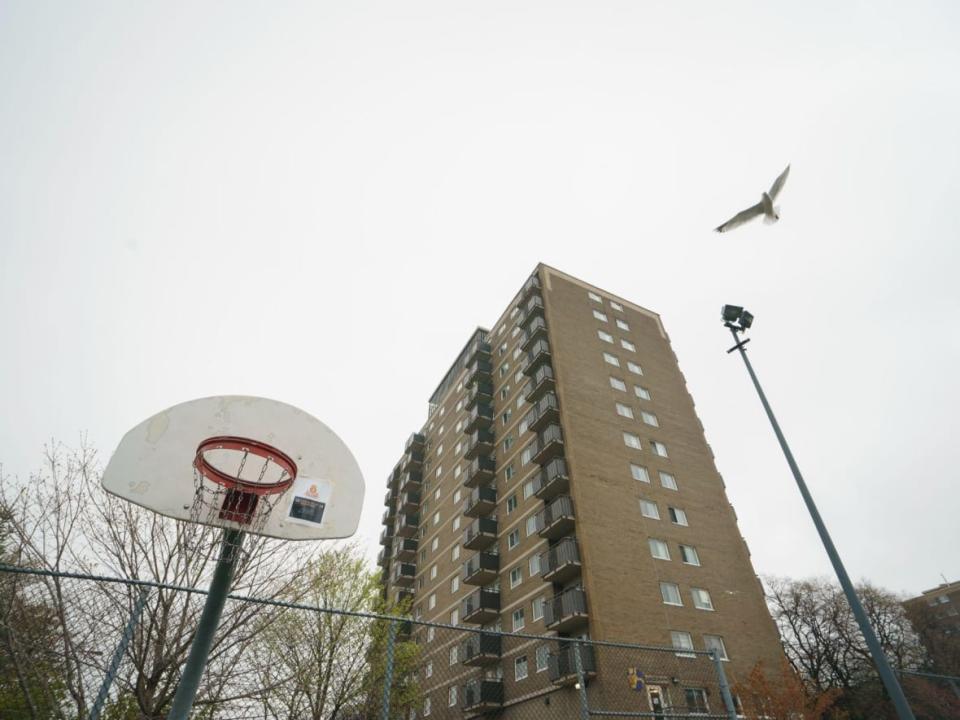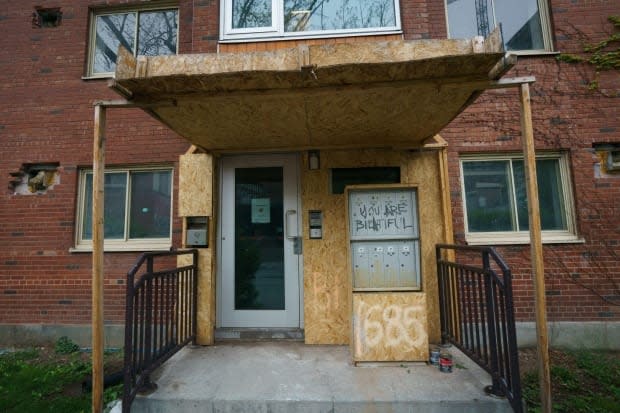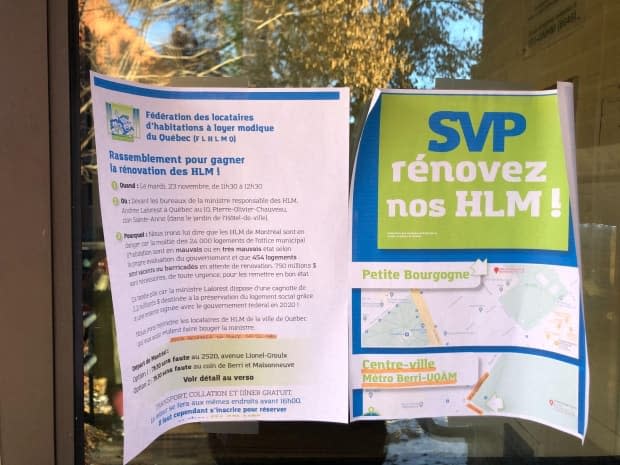As Quebec invests in social housing, concerns remain over timeline of repairs

Walking around her apartment, Tina-Lili Gagné points out water damage stains, shoddy repairs, doors and drawers that don't open and close properly anymore and mould in the hallways. She's exhausted.
"It's very hard living like this," she said. "It's not good for your mental health to live somewhere so old and broken."
Gagné has been living in her social housing unit with her four sons for seven years. Despite previous issues with cockroaches and poor maintenance, she said her apartment is one of the best in the building.
As a member of the advisory committee of tenants in low-rent housing, she represents both people living alone and families. She's been fighting to get her building renovated for the last five years, but the move kept getting postponed due to lack of funding. She said constantly waiting to know when her family would finally be able to move put her under a lot of stress.
Quebec's social housing, known in French as HLMs, has been neglected for decades. Funding for both renovations and new units has been slow to come in. Buildings have been overlooked for so long that about 25,000 units of social housing in the province earn themselves a "D" or "E" grade, meaning they're in bad shape and in need of serious renovations.
Gagné's building was graded "E." Half of its units are empty because they are uninhabitable, she said.

Last month, Quebec Housing Minister Andrée Laforest announced that $2 billion of funding that was part of a 2020 agreement with the federal government will go toward repairing low-income housing, like Gagné's apartment, over the next six years.
The agreement was long awaited by housing groups, but the province has yet to specify how much money is going to each region.
Advocates say it's not enough, and tenants like Gagné are worried renovations may take years to complete.
"They're announcing this money from the federal government but there's no real plan to tackle the housing crisis," said Véronique Laflamme, a spokesperson for the housing rights group FRAPRU.
The sums allocated to each region will be announced soon, Bénédicte Trottier-Lavoie, a spokesperson for Loforest, said in a statement.
Funding has tapered off over decades
Avi Friedman, a professor of architecture at McGill University who has researched social housing conditions, said public funding for low-income housing has been in decline since the 1980s, when the federal government shifted responsibility onto provinces and cities.
Over the years, all three levels of government preferred giving subsidies to individuals to rent in the private sector rather than continue to invest in social housing, he said.
As funds were phased out, existing buildings deteriorated and there was little money for renovations, or to build new units.
Now, he said, the government has to put money into social housing because what's available to low-income renters falls far short of what's needed.
"If you ask me what the prospect is, I believe that we need to dial back the clock," said Friedman. "We need to return to 1970s cities."

Quebec's economic update deemed 'worrisome'
Though they're happy to see money go into renovating low-income units, housing groups are apprehensive the province will neglect building new social housing units — which they say is necessary to combat the growing crisis.
In its economic update on Nov. 26, the Coalition Avenir Québec government hinted at a potential move away from AccèsLogis, the provincial program to build social housing.
Instead, $197 million would go toward a new program that would be established favouring the construction of 2,200 units of "affordable housing" from the private sector over five years.
Advocates like Laflamme expressed concern that the units won't really be affordable or stay affordable a few years down the line. They say turning to the private sector could open the door to more discrimination and fraudulent evictions, and that social housing is the only way to assure people have access to truly affordable homes.
"It's very worrisome," said Laflamme.

Quebec Finance Minister Eric Girard said last week that developers will get more money the longer housing stays affordable. The program is also open to community organizations and to non-profit groups and the current AccèsLogis program is still in place, he said.
But Laflamme points out that building affordable housing through AccèsLogis has stalled and become inefficient because it's been underfunded for years.
Consultations to improve AccèsLogis have taken place over the last five years, but to no avail, said Laflamme. She critiqued the CAQ for creating a new program that would take months to implement.
With new money coming in, Gagné is hopeful her apartment will be properly renovated. She stresses the importance of not only having social housing, but also keeping units in good condition.
"It's important to take care of our elders, of those with mental illness," said Gagné. "It's not profitable to take care of the poor, but it's not a choice we made. We deserve to live in dignity."

 Yahoo Finance
Yahoo Finance 